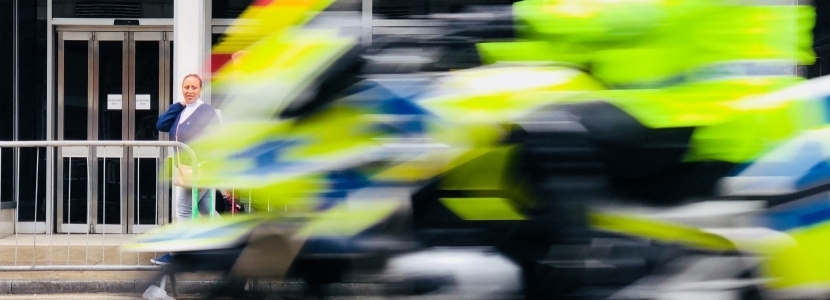
- Newly released figures show that 2,153 police officers have been recruited in London and Surrey as part of the Conservative Government’s pledge to put 20,000 more officers on the streets by 2023.
- Since the recruitment drive was launched in 2019, the 43 police forces across England and Wales have seen an additional 11,053 police officers recruited, putting the Government on track to deliver on its manifesto promise – and figures show that over four in ten new recruits are women.
- The additional police for London and Surrey builds on the Conservative Government’s Beating Crime Plan and Police, Crime, Sentencing and Courts Bill – aimed at reducing crime, protecting victims and making the country safer.
Mario Creatura has welcomed the announcement that 2,153 police officers have been recruited in London and Surrey since September 2019, bringing the total number of officers up to 36,026.
The latest figures are part of the Conservative Government’s drive to get 20,000 more police officers on the street by 2023, and puts the Government on track to fulfil its manifesto commitment.
Across the 43 police forces, an additional 11,053 officers have been recruited, bringing the total number of police officers in England and Wales to 139,908 – where they are already having an impact in tackling crime and keeping communities safe.
The latest figures also show that the police are more representative of the communities they serve. More than four in ten new recruits since April 2020 are female, and eight police forces across the country – Derbyshire, Lancashire, Greater Manchester, Staffordshire, Sussex, Thames Valley, Kent and Suffolk – have all hired more women than men. Additionally, over 11 per cent of new recruits identify as belonging to a Black, Asian, Mixed or other minority ethnic group.
The 11,000 extra officers will support the Conservative Government’s crack down on crime, which has seen the launch of the Beating Crime Plan and the passing of the Police, Crime, Sentencing and Courts Bill through the House of Commons.
The Beating Crime Plan – aimed at reducing crime, protecting victims, and making the country safer – will see investments in school-based interventions methods, increased tagging to reduce repeat and substance-fuelled offences, and ensures that offenders give back to their communities through unpaid work.
The Police Crime, Sentencing and Courts Bill – which is currently passing through the House of Commons – gives the police the resources they need to crack down on crime, including additional powers to tackle disruptive protests, increased sentences for the most dangerous offenders, and additional protections for women and girls.
This builds on the action already taken by the Conservative Government since Boris Johnson became Prime Minister two years ago – including boosting police funding to a record £15.8 billion and delivering £70 million through the Safer Streets Fund to make neighbourhoods secure.
Commenting, Mario said:
“I know just how valuable 2,153 more police officers will be in helping to crack down on crime.
“The 2,153 additional recruits mean there are now 36,026 police officers in London and Surrey, helping to keep neighbourhoods secure and reassuring the law-abiding majority that they are safe.
“These figures show that – once again – the Conservatives are delivering on our manifesto commitments, keeping communities safe and delivering on the people’s priorities”.
Commenting, Prime Minister Boris Johnson said:
“It is fantastic that we are now over half-way in delivering on our commitment of 20,000 more police officers by 2023.
“Every police force area in our country will benefit from more officers, meaning safer streets, secure neighbourhoods, and more support for victims”
Home Secretary Priti Patel said:
“I am delighted that we have recruited over 11,000 new police officers in England and Wales. These figures mean we are well on track to meet our target of recruiting 20,000 extra police officers by 2023.
“Together with our Beating Crime Plan, this Government is determined to crack down on crime and back our police with the powers they need – and these figures mean there are now over 11,000 additional police officers able to shut down drug gangs, take knives off our streets, and protect communities from harm”.
- Home Office figures show 11,053 extra police officers have been recruited nationally in Q3 2021 (Home Office, Official Statistics, 27 October 2021, link).
- Home Office figures show 2,153 extra police officers have been recruited in London and Surrey since September 2019 (Home Office, Official Statistics, 27 October 2021, link).
- The Government has promised to recruit 20,000 extra police officers by 2023. The police recruitment drive is the biggest in decades and follows the Prime Minister’s commitment to increase police numbers over the next 3 years (Home Office, News Story, 5 September 2019, link).
- The Government’s Beating Crime Plan and Police, Crime, Sentencing and Courts Bill introduce a range of reforms to policing in England and Wales. Measures include increased tagging to reduce repeat and substance-fuelled offences, and ensuring that offenders give back to their communities through unpaid work (UK Government, Beating Crime Plan, 27 July 2021, link).
- The Police, Crime, Sentencing and Courts Bill has introduced tougher sentences for criminals and provides additional resources to police. Measures include additional powers to tackle disruptive protests, increased sentences for the most dangerous offenders, and additional protections for women and girls (Home Office, Policy Paper, 7 July 2021, link).
- More than four in ten new police recruits are women and Derbyshire, Lancashire, Greater Manchester, Staffordshire, Sussex, Thames Valley, Kent and Suffolk – have all hired more women than men. Female officers accounted for 45 per cent of new joiners between July and September 2021 (Home Office, News story, 27 October 2021, link).
- The Safer Streets Fund will invest £70 million in making our streets safer. This includes £23.5 million in projects to help women and girls feel safe (Home Office, News story, 27 October 2021, link).
Photo by John Cameron on Unsplash


